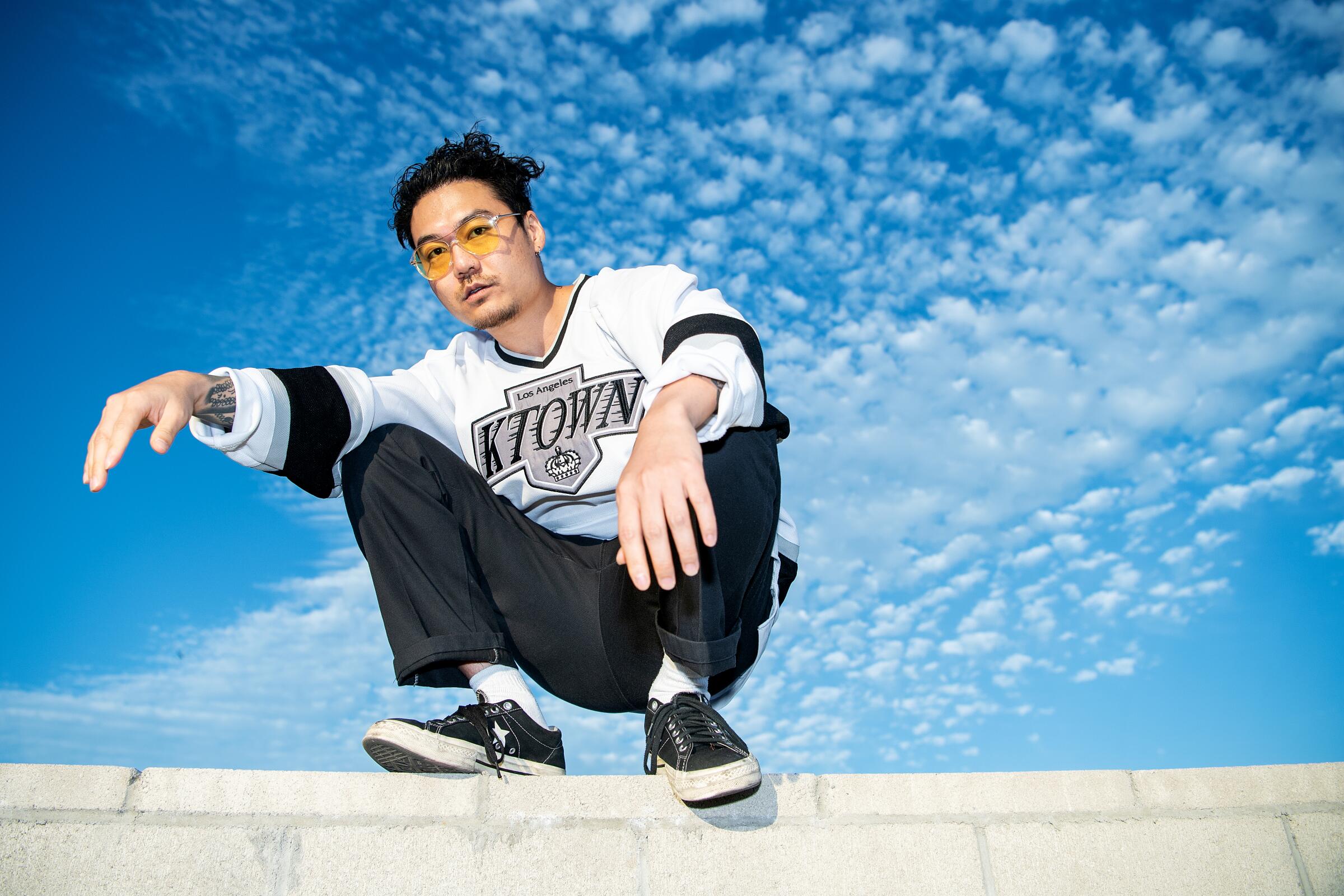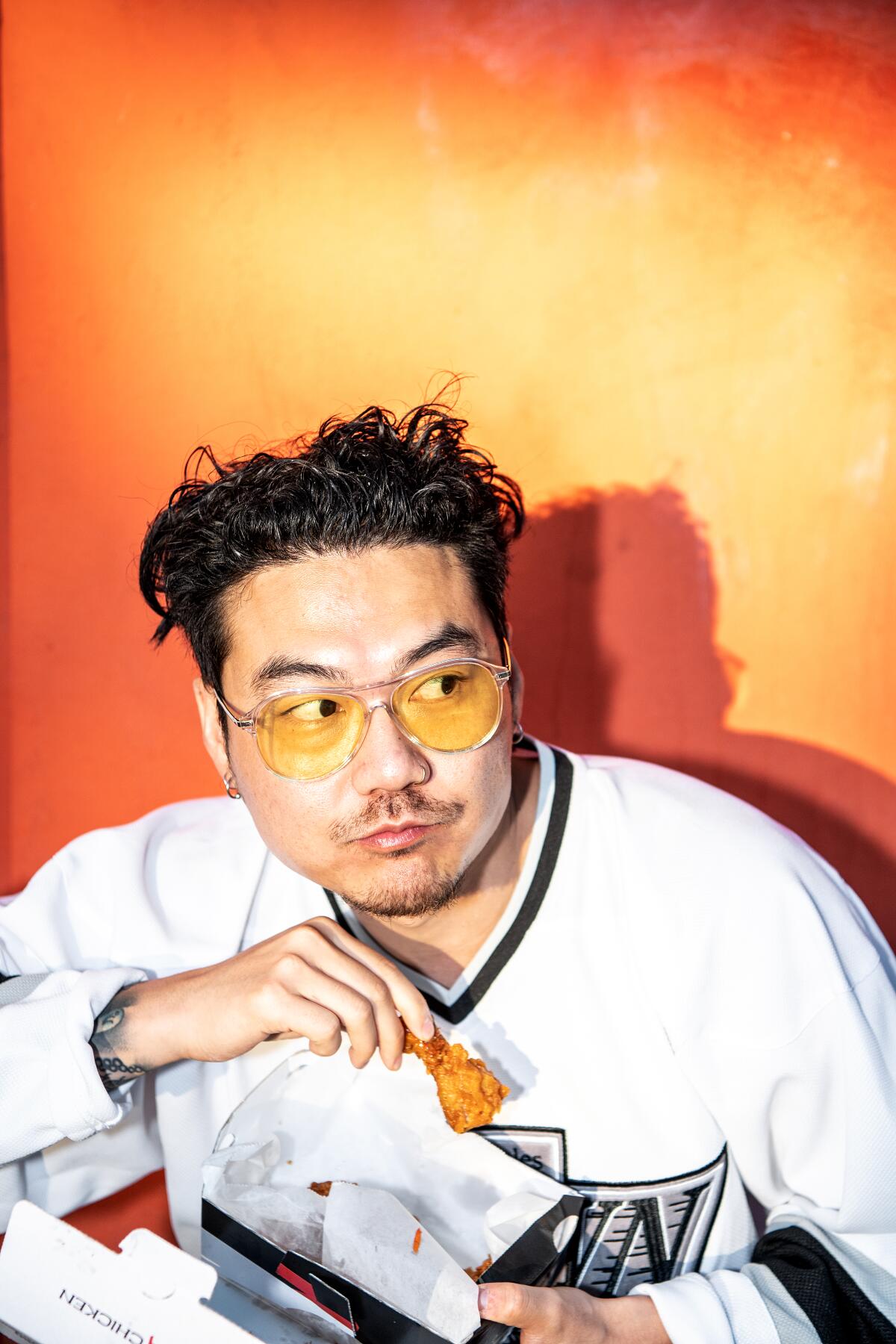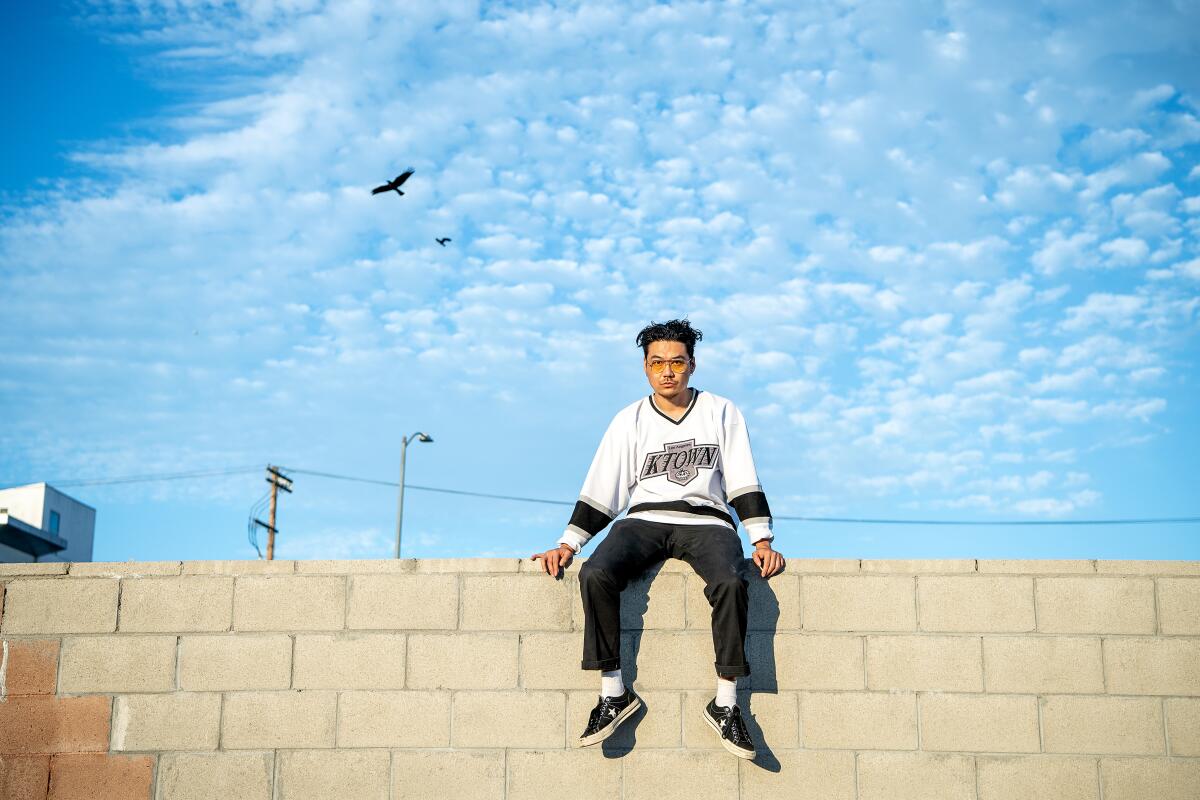Newsletter
Eat your way across L.A.
Get our weekly Tasting Notes newsletter for reviews, news and more.
You may occasionally receive promotional content from the Los Angeles Times.

For nearly three years, a mural of Jonathan Park’s face adorned a white wall outside Catalina Liquor in Koreatown, his home and the neighborhood he’s become inseparably tied to as the rapper Dumbfoundead.
The artwork, a collage of thick and deliberate brushstrokes by L.A.-based artist Joseph Lee, was the backdrop to Park’s 2016 “Murals” music video, in which he sports one of his signature merch items: a T-shirt styled in Los Angeles Dodgers’ script that reads “Koreatown” and “92,” a reference to the civil unrest that scarred the community and shaped Southern California’s Korean diaspora.
But when Park learned taggers had scrawled over the mural last summer, he did not lament. He was grateful it had lasted longer than he had expected. It would not be repainted, he said. It was time for a new beginning.
These days, Park finds himself embarking on several new beginnings at once. Since he first gained notoriety as a battle rapper in the mid-aughts, he’s carved out a successful career in hip-hop, putting out five studio albums and four EPs and touring extensively.
He’s also gained a foothold on TV and the big screen. He and friend Nora Lum — whose rise as Awkwafina also spans mediums — were featured in the 2016 film “Bad Rap,” a documentary following Asian American hip-hop artists. He followed that with a starring role in the 2017 battle-rap comedy/drama “Bodied,” directed by Joseph Kahn and produced by Eminem. Park also has a recurring role on Lum’s Comedy Central show “Awkwafina Is Nora From Queens,” which was renewed for a second season.
Recently, Park’s career has expanded into the food media world with a new First We Feast show that was made for and inspired by these pandemic times, “The Takeout.” In it, he orders food from restaurants for himself and his guest, whom he interviews over video chat.
“This was actually very perfect for me, somebody who doesn’t know how to cook and who loves restaurant culture and eating out,” Park said. “I’ve been touring and stuff since I was young, so I jumped right into having a busy schedule and just getting something quick on the run, takeout, delivery, eating at restaurants.”
So far on the show, Park has dined on kimchi jjigae, galbi jjim and haemul pajeon from Jun Won in Koreatown with Jay Park, the Seoul-based rapper who in 2017 became the first Asian American artist to sign with Jay-Z’s entertainment agency, Roc Nation. He also has indulged in a chili-loaded meal from Original Tommy’s with New York rapper Pardison Fontaine; galbi and a spread of banchan from Park’s BBQ with comedian Jo Koy; pasta from Stevie’s Creole Cafe in Mid-Wilshire with Andy Milonakis; and jajangmyeon from Young King with actor-comedian Jimmy O. Yang.
“A lot of the places that I’m putting on the show are places I’ve been going for a long time,” Park said. “Next thing I want to do is support one of my favorite Mexican spots.”

The struggles of the industry aren’t lost on Park. Episodes open with a call to support restaurants during the pandemic while First We Feast flashes its support for the Restaurant Workers’ Community Foundation, a nonprofit advocacy group that supports restaurant workers affected by COVID-19.
“Restaurants are establishments we celebrate in — graduations, birthday parties or whatnot,” Park said. “A lot of these places they literally ran on word-of-mouth. … They didn’t care about no advertising, nothing. Korean spots could have menus just in all Korean, and it’ll still be popping daily.”
Park’s pride in his home neighborhood is reflected in his work.
In April, it was announced that NBC’s new digital subscription service Peacock had begun development on a comedy based on Park’s life, “Big Dummie.” The show will be set in a diverse community that’s slowly gentrifying, much like Koreatown.
“I definitely wanted to incorporate the neighborhood that I come from, and what I mean to the neighborhood. And what the neighborhood means to me, how the neighborhood is changing for me, and how I’m changing to the neighborhood, as well,” Park said. “It’s just all around, change is happening.”
Through his music, Park has been an ambassador of sorts for Koreatown.
“When I was touring, a lot of my merch items say ‘Koreatown’ on it,” Park said. “Kids from Australia and Europe are copping it. I don’t even know if they know what Koreatown is.”
More recently, Park has tried to be a unifying voice during a period of unrest and action.
The killing of George Floyd by Minneapolis police sparked a wave of nationwide protests against police brutality toward Black Americans. For Koreatown, when peaceful demonstrations sometimes flared into moments of destruction, the images of boarded-up windows stirred painful memories of Saigu, Korean for “4/29.” If just for a moment, it reminded some of the armed shop owners and workers perched on rooftops and in parking lots along Western Avenue 28 years ago.
The rooftop ahjussis engender a certain reverence. Many feel Koreatown was abandoned by Los Angeles police, and that these men armed themselves to protect their fledgling livelihoods and, by extension, their growing families.
But like his mural, Park doesn’t want this to be a lasting image of Koreatown.
“I feel like there’s a young generation of Korean Americans who saw those images, and they looked at these guys, they fetishized this hero-type of militant lifestyle of protecting your stores,” he said. “I don’t think you should be images of fear, because all that does is divide.”

Park, who helped Koreatown business owners board up their shops during the recent wave of protests, said he’d like more “people at the pond,” ready to engage and listen. That includes sending his mother translated guides to the Black Lives Matter movement and, later, mother and son marching on the streets of L.A. toward City Hall together, carrying signs that read “Koreans for Black Lives” and “I Can’t Breathe 제발, 숨막혀.”
“We actually have the resources and knowledge to do more,” he said.
Park shared some of the criticism he’s received from within the community on social media.
“Me, as a Koreatown voice, I’m already getting grilled for it. I’ve been getting messages like I’m a ‘disgrace to Asians’ and all that. But to me, I feel like this is the most responsible thing I can do as a leader, as opposed to create another divide and 28 years later be in the same situation with both communities,” Park said.
Park said he’s more comfortable with himself now than ever. Honesty and vulnerability are at the heart of his approach to life and work these days. That includes straight talk with his community, and how he views himself in his neighborhood.
“To have longevity you gotta have growth, and you’re just not going to have growth when you’re stuck in a comfort zone,” Park said.
“If you’re really proud of a neighborhood you come from, you got to rep it outside of the neighborhood, not inside. To me, I was so Ktown — so Ktown. Hip-hop really helped me think outside of my own community and see how I could really help my community from taking it outside the walls of Koreatown.”
Eat your way across L.A.
Get our weekly Tasting Notes newsletter for reviews, news and more.
You may occasionally receive promotional content from the Los Angeles Times.